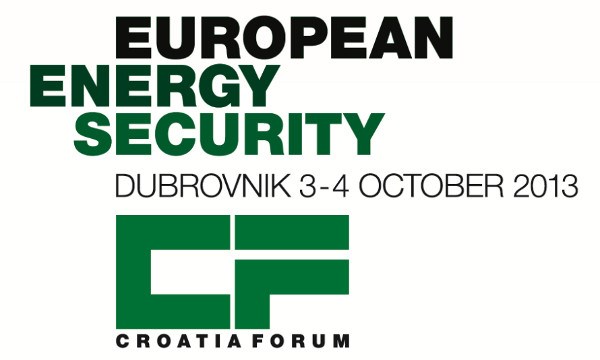Croatia Forum 2013
Thursday, 3 October 2013
17.00 Opening Session: The Role of Energy in International Relations
Venue: Mare I Hall
Energy issues are playing an increasingly role in defining the politics of the 21st century and therefore can exert influence on contemporary international relations. Europe itself is faced with challenges in terms of global energy exploitation and supply. Safe, secure, sustainable and affordable energy sources and supply ale crucial to continued economic stability and strategic interests of Europe. Strengthening the role of the EU in international energy relations is crucial, particularly in regards of securing a political solution for its dependency on foreign supplies. Energy issues transcend borders, and for that reason, isolated national solutions can hardly provide adequate and long-term answers. Moreover, energy issues are also economic and strategic issues. Therefore the maintenance and reinforcement of Europeacutes energy security therefore necessitates the questions of finding a balance between commercial and political interests.
Introductory remarks: Ms Vesna Pusić, First Deputy Prime Minister and Minister of Foreign and European Affairs
Mr. Ivo Josipović, President of the Republic
Panelists:
Vesna Pusić, First Deputy Prime Minister and Minister of Foreign and European Affairs, Croatia
Zlatko Lagumdžija, Vice Chairman of the Council of Ministers and Minister of Foreign Affairs, Bosnia and Herzegovina
Igor Lukšić, Deputy Prime Minister and Minister of Foreign Affairs and European Integration, Montenegro
Ahmet Davutoglu, Minister of Foreign Affairs, Turkey
Amos J Hochstein, Deputy Assistant Secretary for Energy Diplomacy, US Department of State, USA
Savva Mikhail, Deputy Director, Department for Economic Cooperation, Ministry of Foreign Affairs, Russia
Michael Rühle, Head of Energy Security Section, NATO
19.00 Family Photo
20.00 Dinner hosted by Ms Vesna Pusić, First Deputy Prime Minister and Minister of Foreign and European Affairs
Friday 4 October 2013
09.00 Panel Session (I): Energy Policy of the European Union
Venue: Mare I Hall
The EUacutes energy policy must ensure security of supply for households and industry at affordable and competitive prices, in a safe and sustainable manner. This is particularly important for Europeacutes competitiveness in the light of increasing energy demands from emerging economic powers. In May 2013, the European Council agreed on a series of guidelines in four fields of Energy Policy which together should allow the EU to increase its competitiveness as well as respond to the challenge of high prices and other related costs: urgent completion of a fully functioning and interconnected internal energy market facilitation of required investment in the energy sector a diversification of Europeacutes energy supplies and enhanced energy efficiency.
Panelists:
Edgars Rinkevičs, Minister of Foreign Affairs, Latvia
Carl Bildt, Minister of Foreign Affairs, Sweden
Reinhold Lopatka, State Secretary in the Federal Ministry for European and International Affairs, Austria
Peter Burian, First Deputy Minister, Ministry of Foreign and European Affairs, Slovakia
Rolandas Kriščiunas, Vice-Minister, Ministry of Foreign Affairs, Lithuania
Bruno Maçaes, State Secretary of European Affairs, Ministry of Foreign Affairs, Portugal
George Ciamba, State Secretary of European Affairs, Ministry of Foreign Affairs, Romania
11.00 Coffee break
11.30 Panel Session (II): EUacutes Energy Security and the Southern Gas Corridor
Venue: Mare I Hall
Natural gas is an essential component in the energy supply of the European Union, constituting one
quarter of its primary energy supply. Therefore, it is essential that the EU secures a diversified portfolio of gas sources and routes, and a fully interconnected and bi-directional gas network as well as enhanced storage capacities and enhanced infrastructure for liquefied and compressed natural gas. With decreasing domestic production, gas imports have increased even more rapidly, thus creating higher import dependence. The European Commission recently welcomed the selection of the Trans-Adriatic Pipeline (TAP) as an integral part of the European route of the Southern Gas Corridor, directly and physically linking the EU gas market to the largest deposits of gas in the world in the Caspian Sea basin and the Middle East. Together with developing a network based on interconnections that are to allow the further supply of Caspian gas to other parts of Europe, this is of crucial importance in strengthening overall energy security for the entire European continent. In this context, energy can be deemed as yet another unifying factor that bonds European countries through closer regional cooperation.
Panelists:
Ivan Vrdoljak, Minister of Economy, Croatia
Ditmir Bushati, Minister of Foreign Affairs, Albania
Nikola Poposki, Minister of Foreign Affairs, Macedonia
Vera Mavrić, State Secretary, Ministry of Foreign Affairs, Serbia
Victor Mayko, Deputy Minister, Ministry of Foreign Affairs, Ukraine
Fabrizio Barbaso, Deputy Director-General, DG Energy, European Commission
13.15 Concluding Session and Press conference
Documents
- About Dubrovnik
- Visuals (1083kb)
- Press Accreditation (75kb)
- Programme (305kb)
- Photos
- Video




